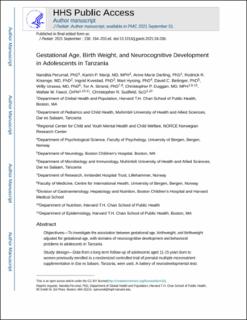Gestational Age, Birth Weight, and Neurocognitive Development in Adolescents in Tanzania
Perumal, Nandita; Manji, Karim P.; Darling, Anne Marie; Kisenge, Rodrick R.; Kvestad, Ingrid; Hysing, Mari; Belinger, David C.; Urassa, Willy; Strand, Tor Arne; Duggan, Christopher P.; Fawzi, Wafaie W.; Sudfeld, Christopher R.
Journal article, Peer reviewed
Published version

Åpne
Permanent lenke
https://hdl.handle.net/11250/2774898Utgivelsesdato
2021Metadata
Vis full innførselSamlinger
Sammendrag
Objectives: To investigate the association between gestational age, birthweight, and birthweight adjusted for gestational age, with domains of neurocognitive development and behavioral problems in adolescents in Tanzania. Study design: Data from a long-term follow-up of adolescents aged 11-15 years born to women previously enrolled in a randomized controlled trial of prenatal multiple micronutrient supplementation in Dar es Salaam, Tanzania, were used. A battery of neurodevelopmental tests were administered to measure adolescent general intelligence, executive function, and behavioral problems. The INTERGROWTH-21st newborn anthropometric standards were used to derive birthweight for gestational age z-scores. We assessed the shape of relationships using restricted cubic splines and estimated the associations of gestational age, birthweight, and birthweight for gestational age z-score with adolescent development using multivariable linear regressions. Results: Among adolescents studied (n = 421), higher gestational age (per week), birthweight (per 100 grams), and birthweight for gestational age z-score (per SD) were linearly associated with higher intelligence score (adjusted standardized mean difference, 0.05 SD [95% CI, 0.01-0.09], 0.04 SD [95% CI, 0.02-0.06], and 0.09 SD [95% CI, 0.01-0.17], respectively). Birthweight and birthweight for gestational age z-score, but not gestational age, were also associated with improved executive function. Low birthweight (<2500 g) was associated with lower intelligence and executive function scores. Associations between birthweight and executive function were stronger among adolescents born to women with higher education. Conclusions: The duration of gestation and birthweight were positively associated with adolescent neurodevelopment in Tanzania. These findings suggest that interventions to improve birth outcomes may also benefit adolescent cognitive function
